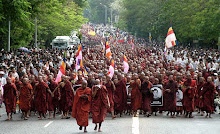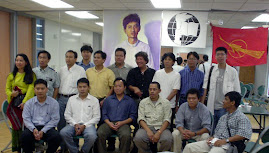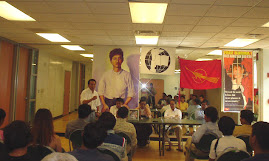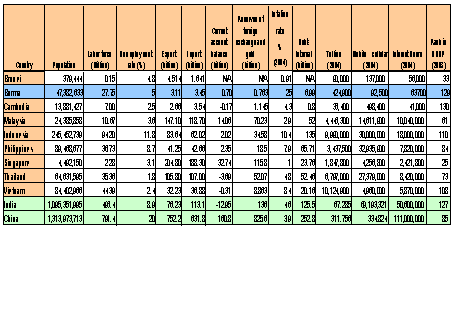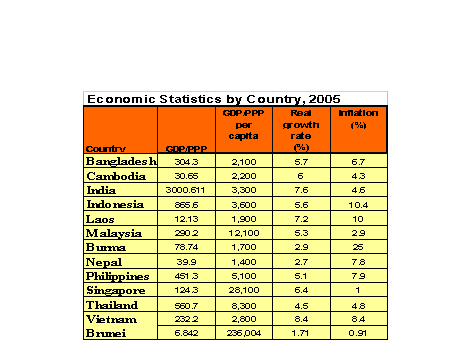Vietnam, Laos oppose Asean 'interference'
Writer: THANIDA TANSUBHAPOL AND AGENCIES
Thailand, as chair of the Association of Southeast Asian Nations, has proposed that other Asean members ask the Burmese government to give a pardon to its opposition leader Aung San Suu Kyi.
But two Asean members - Vietnam and Laos - oppose Thailand's move, saying Asean should not interfere in the affairs of Burma.
Foreign Minister Kasit Piromya said Thailand has written to other Asean members seeking a consensus to demand that the Burmese government considers giving a pardon to Mrs Suu Kyi.
Thailand has also sent a copy to Burmese Foreign Minister Nyan Win, said Mr Kasit, who was in Malaysia for the Thai-Malaysian Joint Commission in Sabah state.
"We are waiting for a reply from other Asean members," said Mr Kasit.
The Burmese court on Tuesday sentenced Mrs Suu Kyi to another 18 months of house arrest for violating house arrest rules, after an American man swam across a lake to stay uninvited at her villa for two days in May.
Mr Kasit said no special meeting among Asean foreign ministers would be held on the issue, because at least four countries were not ready. He did not say which countries.
But Vietnam disagrees with Thailand's call.
Vietnam state media reported yesterday that Vietnam did not support calls by other Asean member states for Burma to free Mrs Suu Kyi.
The state-run Viet Nam News said Vietnam had no criticism of Burma's decision on Tuesday to place Mrs Suu Kyi under house arrest for the next 18 months, effectively barring her from elections next year.
"It is our view that the Aung San Suu Kyi trial is an internal affair of Burma," Vietnamese government spokesman Le Dung said on the website of the Ministry of Foreign Affairs.
On Wednesday, the Thai government called on Burma to release Mrs Suu Kyi immediately and allow her to participate in next year's elections, echoing its own statements and those of other Asean members at the group's regional forum last month.
Mr Dung said Vietnam had always supported Burma and hoped it would continue to implement the "roadmap to democracy" that has been outlined by its government.
Laos said it shared the same view as Vietnam. Vientiane said the trial of Mrs Suu Kyi took place in accordance with the country's law.
It was opposed to interfering in neighbouring nations' affairs.
"As a member of Asean, we uphold the basic principles of Asean as stipulated in the Asean Charter, particularly the principle of non-interference in [each other's] internal affairs," said Lao foreign affairs spokesman Khenthong Nuanthasing.
"We believe the recent trial of Aung San Suu Kyi was conducted in accordance with the judicial process of Burma," he added. "We are confident Burma will be able to implement the seven-step roadmap that will lead to democratisation, successfully and within the specified time."
Burma has notched up one of the world's worst human rights records, and its refusal to free Mrs Suu Kyi has inspired near universal outrage and condemnation.
Rest of your post
Friday, August 14, 2009
Free Suu Kyi call vetoed
Tuesday, August 11, 2009
နအဖ စစ္ကြ်န္ၿပဳေကာင္စီ ဥကၠ႒က ေဒၚစုအေပၚ သက္ညႇာခြင့္ျပဳရန္ ညႊန္ၾကား
-မဇၥ်ိမသတင္း-
အဂၤါေန႔၊ ၾသဂုတ္လ 11 ရက္ 2009 ခုႏွစ္ 12 နာရီ 39 မိနစ္
ျမန္မာ့ဒီမိုကေရစီေခါင္းေဆာင္ ေဒၚေအာင္ဆန္းစုၾကည္၊ သူမႏွင့္အတူေန ေဒၚခင္ခင္ဝင္းႏွင့္ ေဒၚဝင္းမမတို႔အား ျပစ္ဒဏ္ေလွ်ာ့ေပါ့ေျပာင္းလဲျခင္း၊ ဆုိင္းငံ့ျခင္း၊ ေကာင္းမြန္စြာ ေနထုိင္ပါက လြတ္ၿငိမ္းခ်မ္းသာခြင့္ျပဳျခင္းႏွင့္ ပတ္သက္၍ နအဖ စစ္ေကာင္စီဥကၠ႒က ျပည္ထဲဝန္ၾကီးဌာနသို႔ ညႊန္ၾကားခ်က္ ထုတ္ျပန္ခဲ့သည္။
ျပည္ထဲေရးဝန္ၾကီးဌာနကလည္း အင္းစိန္ေထာင္တြင္း တရားခြင္သို႔ ထပ္ဆင့္၍ အမိန္႔ထုတ္ျပန္ခဲ့ပံုကို ယေန႔ ေန႔ခင္းပိုင္းတြင္ ျမန္မာ့အသံမွေန၍ ထုတ္လႊင့္ေပးခဲ့သည္။
အဆိုပါ ထုတ္လႊင့္ခ်က္ကို တင္ျပလိုက္ပါသည္။
ျပစ္မႈဆိုင္ရာ က်င့္ထံုးဥပေဒအရ ေလွ်ာ့ေပါ့ေျပာင္းလဲျခင္း၊ ဆိုင္းငံ့ျခင္းႏွင့္ ေကာင္းမြန္စြာ ေနထိုင္ပါက လြတ္ၿငိမ္းခ်မ္းသာခြင့္ျပဳျခင္း
အပိုဒ္ ၁ ။ ရန္ကုန္တိုင္း ေျမာက္ပိုင္းခ႐ိုင္ တရား႐ံုးတြင္ ျပစ္မႈဆိုင္ရာ အမႈၾကီးအမွတ္ ၄၇/၂ဝဝ၉ ျဖင့္ ႏိုင္ငံေတာ္အား ေႏွာင့္ယွက္ဖ်က္ဆီးလိုသူမ်ား၏ ေဘးအႏၲရာယ္မွ တားဆီးကာကြယ္သည့္ ဥပေဒ ၂၂ ပါ ျပ႒ာန္းခ်က္ကို ေဖာက္ဖ်က္က်ဴးလြန္ခဲ့သျဖင့္ ေဒၚေအာင္ဆန္းစုၾကည္ (ဘ) ဦးေအာင္ဆန္းအေပၚ တာဝန္ရွိသူမ်ားက မလႊဲမေရွာင္သာဘဲ တရားစြဲဆိုျခင္း ျပဳခဲ့ရျခင္းကို ႏိုင္ငံေတာ္ ေအးခ်မ္းသာယာေရးႏွင့္ ဖြံ႔ၿဖိဳးေရးေကာင္စီအေနျဖင့္ စိတ္မခ်မ္းေျမ႕ဖြယ္ရာ ျဖစ္ခဲ့ပါသည္။
အပိုဒ္ ၂ ။ သို႔ရာတြင္ တရားဥပေဒ စိုးမိုးေရးအတြက္ တည္ဆဲဥပေဒႏွင့္အညီ မွန္ကန္မွ်တစြာ တရားစီရင္မႈကို ႏိုင္ငံသား အားလံုးက ေလးစားလိုက္နာ ခံယူၾကရမည္ ျဖစ္သည္။
အပိုဒ္ ၃ ။ ေဒၚေအာင္ဆန္းစုၾကည္သည္ ျမန္မာႏိုင္ငံ၏ လြတ္လပ္ေရးကို အသက္ေပး၍ ရယူေပးခဲ့သည့္ ႏိုင္ငံ့ေခါင္းေဆာင္ ဗိုလ္ခ်ဳပ္ေအာင္ဆန္း၏ သမီး ျဖစ္ျခင္းေၾကာင့္လည္းေကာင္း၊ ရပ္ရြာ ေအးခ်မ္းသာယာေရးႏွင့္ တည္ၿငိမ္ေရးကို ေရွးရႈ၍လည္းေကာင္း၊ တဦးအေပၚတဦး အာဃာတမ်ား မရွိေစေရး အတြက္လည္းေကာင္း၊ ဒီမိုကေရစီလမ္းေၾကာင္းတြင္ အေႏွာင့္အယွက္ မျဖစ္ေစေရး အတြက္လည္းေကာင္း ေရွးရႈ၍ ႏိုင္ငံေတာ္ ေအးခ်မ္းသာယာေရးႏွင့္ ဖြံ႔ၿဖိဳးေရးေကာင္စီ အေနျဖင့္ မိမိ၏ လုပ္ပိုင္ခြင့္ အာဏာအတြင္းမွ သူမကို စာနာေထာက္ထား ညႇာတာမႈ ျပဳလိုပါသည္။
အပိုဒ္ ၄ ။ သို႔ပါ၍ ေဒၚေအာင္ဆန္းစုၾကည္အား တရား႐ံုးအေနျဖင့္ ျပစ္မႈက်ဴးလြန္ေၾကာင္း ထင္ရွားေတြ႔ရွိရၿပီး ျပစ္ဒဏ္ခ်မွတ္ပါက မည္သို႔ပင္ ျပစ္ဒဏ္ခ်မွတ္ထားသည္ျဖစ္ေစ ျပစ္မႈဆိုင္ရာ က်င့္ထံုးဥပေဒ ပုဒ္မ ၄ဝ၁ ပုဒ္မခြဲ ၅ အရ တရား႐ံုးက ခ်မွတ္ထားေသာ ျပစ္ဒဏ္မ်ားအနက္ ျပစ္ဒဏ္၏ ထက္ဝက္ကိုသာ က်ခံေစရန္ ေလွ်ာ့ေပါ့ ေျပာင္းလဲလိုက္ၿပီး က်န္ရွိေသာ ျပစ္ဒဏ္ကိုလည္း ဆိုင္းငံ့လိုက္သည္။
အပိုဒ္ ၅ ။ အထက္ အပိုဒ္ ၄ ပါ ျပစ္ဒဏ္ ဆိုင္းငံ့ကာလအတြင္း ေဒၚေအာင္ဆန္းစုၾကည္အား သူမ၏ ေနအိမ္ျဖစ္ေသာ ဗဟန္းၿမိဳ႕နယ္ ေရႊေတာင္ၾကား ၁ ရပ္ကြက္ တကၠသိုလ္ ရိပ္သာလမ္း ၿခံအမွတ္ (၅၄/၅၆) ေနအိမ္၌ ပူးတြဲပါ သတ္မွတ္ထားေသာ စည္းကမ္းခ်က္မ်ားႏွင့္အညီ ေနထိုင္ခြင့္ ျပဳလိုက္သည္။
အပိုဒ္ ၆ ။ ေဒၚေအာင္ဆန္းစုၾကည္သည္ ေလွ်ာ့ေပါ့ေျပာင္းလဲလိုက္ေသာ ျပစ္ဒဏ္က်ခံရမည့္ အခ်ိန္ကာလထက္ မေက်ာ္လြန္ေသာ အခ်ိန္ကာလအတြင္း ပူးတြဲပါ သတ္မွတ္ေပးထားေသာ စည္းကမ္းခ်က္မ်ားႏွင့္အညီ ေကာင္းမြန္စြာ ေနထိုင္ပါက ဆိုင္းငံ့ထားေသာ ျပစ္ဒဏ္အားလံုးကို လြတ္ၿငိမ္းခ်မ္းသာခြင့္ ျပဳမည္ျဖစ္ေၾကာင္း အေၾကာင္းၾကားလိုက္သည္။
ဥကၠ႒
ႏိုင္ငံေတာ္ ေအးခ်မ္းသာယာေရးႏွင့္ ဖြံ႔ၿဖိဳးေရး ေကာင္စီ
ႏုိင္ငံေတာ္ ေအးခ်မ္းသာယာေရးႏွင့္ ဖြံ႔ၿဖိဳးေရးေကာင္စီ ဥကၠ႒၏ အဆုိပါ ညြန္ၾကားခ်က္အရ ျပည္ထဲေရး ဝန္ၾကီးဌာနကလည္း ၾသဂုတ္လ ၁ဝ ရက္ေန႔ ရက္စြဲျဖင့္ ျပည္ထဲေရးဝန္ၾကီးဌာန၏ အမိန္႔ကို ဆက္လက္ ထုတ္ျပန္ခဲ့ၿပီး ၎အမိန္႔ကုိ ေဒၚေအာင္ဆန္းစုၾကည္အား ဖတ္ျပအသိေပးၿပီးျဖစ္ေၾကာင္း သတင္းရရွိပါတယ္ခင္ဗ်ာ။
---------------------------------
ႏုိင္ငံေတာ္ ေအးခ်မ္းသာယာေရးႏွင့္ ဖြံ႔ၿဖိဳးေရးေကာင္စီ ဥကၠ႒က ၂ဝဝ၉ ခုႏွစ္ ၾသဂုတ္လ ၁ဝ ရက္ေန႔ ရက္စြဲျဖင့္ ျပည္ထဲေရးဝန္ၾကီးဌာနသို႔ ေဒၚခင္ခင္ဝင္းႏွင့္ ေဒၚဝင္းမမတုိ႔အေပၚ တရား႐ံုးက ျပစ္ဒဏ္ခ်မွတ္ခဲ့ပါက ျပစ္မႈဆုိင္ရာ က်င့္ထံုးဥပေဒအရ ေလွ်ာ့ေပါ့ေျပာင္းလဲျခင္း၊ ဆုိင္းငံ့ျခင္းႏွင့္ ေကာင္းမြန္စြာ ေနထုိင္ပါက လြတ္ၿငိမ္းခ်မး္သာခြင့္ ျပဳျခင္းဆုိင္ရာ ညြန္ၾကားခ်က္ ထုတ္ျပန္ျခင္း
ႏုိင္ငံေတာ္ ေအးခ်မ္းသာယာေရးႏွင့္ ဖြံ႔ၿဖိဳးေရးေကာင္စီ ဥကၠ႒က ၂ဝဝ၉ ခုႏွစ္ ၾသဂုတ္လ ၁ဝ ရက္ေန႔ ရက္စြဲျဖင့္ ျပည္ထဲေရးဝန္ၾကီးဌာနသို႔ ေခၚခင္ခင္ဝင္းႏွင့္ ေဒၚဝင္းမမတုိ႔အေပၚ တရား႐ံုးက ျပစ္ဒဏ္ခ်မွတ္ခဲ့ပါက က်ခံရန္ ရွိေသာ ျပစ္ဒဏ္အား ျပစ္မႈဆုိင္ရာ က်င့္ထံုးဥပေဒအရ ေလွ်ာ့ေပါ့ေျပာင္းလဲျခင္း ဆုိင္းငံ့ျခင္းႏွင့္ ေကာင္းမြန္စြာ ေနထုိင္ပါက လြတ္ၿငိမ္းခ်မ္းသာခြင့္ ျပဳျခင္းဆုိင္ရာ ညြန္ၾကားခ်က္တရပ္ ထုတ္ျပန္ခဲ့သည္။
၎ညြန္ၾကားခ်က္ အျပည့္အစံုမွာ
ျပည္ေထာင္စု ျမန္မာႏုိင္ငံေတာ္ ေအးခ်မ္းသာယာေရးႏွင့္ ဖြံ႔ၿဖိဳးေရးေကာင္စီ ဥကၠ႒႐ံုး
စာအမွတ္ ဝ၄/နယက/ လငခ ဟု
ရက္စြဲ - ၂ဝဝ၉ ခုႏွစ္ ၾသဂုတ္လ ၁ဝ ရက္
သုိ႔
ဝန္ၾကီး
ျပည္ထဲေရး ဝန္ၾကီးဌာန
အေၾကာင္းအရာ။ ။ ေဒၚခင္ခင္ဝင္း (ဘ) ဦးတင္အုန္းႏွင့္ ေဒၚဝင္းမမ (ဘ) ဦးဉာဏ္လင္းတုိ႔အေပၚ တရား႐ံုးက ျပစ္ဒဏ္ခ်မွတ္ခဲ့ပါက က်ခံရန္ရွိေသာ ျပစ္ဒဏ္အား ျပစ္မႈဆုိင္ရာ က်င့္ထံုးဥပေဒအရ ေလွ်ာ့ေပါ့ေျပာင္းလဲျခင္း၊ ဆုိင္းငံ့ျခင္းႏွင့္ ေကာင္းမြန္စြာ ေနထုိင္ပါက လြတ္ၿငိမ္းခ်မ္းသာခြင့္ ျပဳျခင္း။
အပုိဒ္ ၁ ။ ရန္ကုန္တုိင္း ေျမာက္ပုိင္းခ႐ုိင္ တရား႐ံုးတြင္ ျပစ္မႈဆုိင္ရာ အမႈၾကီးအမွတ္ ၄၇/၂ဝဝ၉ ျဖင့္ ႏုိင္ငံေတာ္အား ေႏွာင့္ယွက္ဖ်က္ဆီးလုိသူမ်ား၏ ေဘးအႏၲရာယ္မွ ကာကြယ္ေစာင့္ေရွာက္သည့္ ဥပေဒပုဒ္မ ၂၂ ပါ ျပ႒ာန္းခ်က္ကုိ ေဖာက္ဖ်က္က်ဴးလြန္ခဲ့သျဖင့္ ေဒၚခင္ခင္ဝင္း (ဘ) ဦးတင္အုန္းႏွင့္ ေဒၚဝင္းမမ (ဘ) ဦးဉာဏ္လင္းတုိ႔အေပၚ တရားစြဲဆုိခဲ့သည္။
အပုိဒ္ (၂) ။ ယင္းတုိ႔ ႏွစ္ဦးအေပၚ တရား႐ံုးအေနျဖင့္ ျပစ္မႈက်ဴးလြန္ေၾကာင္း ထင္ရွားေတြ႔ရွိၿပီး ျပစ္ဒဏ္ခ်မွတ္ခဲ့ပါက မည္သုိ႔ပင္ ျပစ္ဒဏ္ခ်မွတ္ထားသည္ျဖစ္ေစ ယင္းတုိ႔ႏွစ္ဦးသည္ ေဒၚေအာင္ဆန္းစုၾကည္ႏွင့္ အတူတကြ ေနထုိင္ၿပီး တဦးကုိတဦး ေစာင့္ေရွာက္ကူညီေနသူမ်ား ျဖစ္ၾက၍ ေနထုိင္မႈ အဆင္ေျပၾကေစေရးအတြက္ ျပစ္မႈဆုိင္ရာ က်င့္ထံုးဥပေဒ ပုဒ္မ ၄ဝ၁ ပုဒ္မခြဲ ၅ အရ တရား႐ံုးက ခ်မွတ္ထားေသာ ျပစ္ဒဏ္မ်ားအနက္ ျပစ္ဒဏ္၏ ထက္ဝက္ကိုသာ က်ခံရန္ ေလွ်ာ့ေပါ့ေျပာင္းလဲလုိက္ၿပီး က်န္ရွိေသာ ျပစ္ဒဏ္ကုိလည္း ဆုိင္းငံ့လုိက္သည္။
အပုိဒ္ (၃) အထက္ အပုိဒ္ ၂ ပါ ျပစ္ဒဏ္ဆုိင္းငံ့ကာလအတြင္း ေဒၚခင္ခင္ဝင္းႏွင့္ ေဒၚဝင္းမမအား ေဒၚေအာင္ဆန္းစုၾကည္၏ ေနအိမ္ျဖစ္ေသာ ဗဟန္းၿမိဳ႕နယ္ ေရႊေတာင္ၾကား ၁ ရပ္ကြက္ တကၠသိုလ္ ရိပ္သာလမ္း ၿခံအမွတ္ ၅၄/၅၆ ေနအိမ္၌ ပူးတြဲပါ သတ္မွတ္ထားေသာ စည္းကမ္းခ်က္မ်ားႏွင့္အညီ ေနထုိင္ခြင့္ ျပဳလုိက္သည္။
အပုိဒ္ (၄) ေဒၚခင္ခင္ဝင္းႏွင့္ ေဒၚဝင္းမမသည္ ေလွ်ာ့ေပါ့ေျပာင္းလဲလုိက္ေသာ ျပစ္ဒဏ္က်ခံရမည့္ အခ်ိန္ကာလထက္ မေက်ာ္လြန္ေသာ အခ်ိန္ကာလအတြင္း ပူးတြဲပါ သတ္မွတ္ေပးထားေသာ စည္းကမ္းခ်က္မ်ားႏွင့္အညီ ေကာင္းမြန္စြာ ေနထိုင္ပါက ဆိုင္းငံ့ထားေသာ ျပစ္ဒဏ္အားလံုးကုိ လြတ္ၿငိမ္းခ်မ္းသာခြင့္ ျပဳမည္ျဖစ္ေၾကာင္း အေၾကာင္းၾကားလုိက္သည္။
ဥကၠ႒
ႏုိင္ငံေတာ္ ေအးခ်မ္းသာယာေရးႏွင့္ ဖြံ႔ၿဖိဳးေရး ေကာင္စီ
ႏုိင္ငံေတာ္ ေအးခ်မ္းသာယာေရးႏွင့္ ဖြ႔ံၿဖိဳးေရးေကာင္စီ ဥကၠ႒၏ အဆုိပါ ညြန္ၾကားခ်က္အရ ျပည္ထဲေရးဝန္ၾကီးဌာနကလည္း ၾသဂုတ္လ ၁ဝ ရက္ေန႔ ရက္စြဲျဖင့္ ျပည္ထဲေရးဝန္ၾကီးဌာန၏ အမိန္႔ကုိ ဆက္လက္ထုတ္ျပန္ခဲ့ၿပီး ၎အမိန္႔ကုိ ေဒၚခင္ခင္ဝင္းႏွင့္ ေဒၚဝင္းမမတုိ႔အား ဖတ္ျပအသိေပးၿပီး ျဖစ္ေၾကာင္း သတင္းရရွိပါတယ္ခင္ဗ်ာ။
Rest of your post
Friday, August 7, 2009
Sunday, August 2, 2009
Saturday, August 1, 2009
Burma's nuclear bomb alive and ticking

Talk to regional security authorities or their embassy staff about Burma having a nuclear programme and it usually generates two responses - total disbelief or horror. Strategic defence studies expert Professor Desmond Ball and journalist Phil Thornton spent two years investigating rumours, speculation, misinformation and the small truths that all help to conceal the Burmese military regime's nuclear ambitions from serious examination
Published: 2/08/2009 at 12:00 AM
Newspaper section: Spectrum
Our own starting position was one of deep skepticism, but the testimonies from two defectors forced us to consider the uncomfortable possibilities of a Burma with nuclear capability.
In June 2007, we began separate interviews with two Burmese defectors in what would become the first in a series of clandestine meetings in dingy rooms and safe-houses that would continue until early July 2009. We first interviewed Moe Jo*, a Burmese army defector, on the Thai-Burma border. Moe Jo had recently crossed the border into Thailand and was still in the initial stage of fright brought on by his flight from the army and loss of community support. His hands shook and he worried about what price his family would have to pay for his actions.
Before rejecting his country's nuclear plans Moe Jo was an officer with 10 years of exemplary army service and a former graduate of Burma's prestigious Defence Services Academy.
In 2003 Moe Jo was selected by the regime to spend two years studying at Moscow's Engineering Physics Institute in the Faculty of Experimental and Theoretical Physics. He says he was sent to Moscow to study engineering and did not know he would end up in the nuclear project. He was in the second batch of 75 trainees sent to Russia as part of Burma's nuclear programme to train 1,000.
We also held a series of interviews in 2008 with a civilian, Tin Min*, who before defecting, worked as a bookkeeper for Tay Za, a business tycoon and close associate of senior Burmese army generals, including General Than Swe. Tay Za's company, Htoo Trading Company, organised the nuclear contracts with Russia and North Korea. Tin Min spoke excellent English and presented his reports to us with a touch of self-importance. Tin Min had good reason to know what it was like to feel important. Before defecting, he had scaled the heights of his country's high-society and had reaped the benefits of that position. Tin Min insisted Burma's rationale for having a nuclear programme was nonsense.
"They [regime] say it's to produce medical isotopes for health purposes in hospitals. How many hospitals in Burma have nuclear science? Burma can barely get electricity up and running. It's a nonsense."
* See companion report: Time for a close look at Burma's nuclear programme
* Also: Report reveals Burma's 2014 nukes target
Considering the World Health Organisation ranks Burma's health system as the second worst out of 192 countries and the regime spends more than 40% of its budget on the military and less than 3% on health and education, it is unlikely Burma is developing and investing in a nuclear reactor for health reasons.
NUCLEAR REACTIONS
What the defectors told us, and access to transcripts of Burmese Army communications, helped us straighten out much of the confusion and speculation on the public record. It has been widely reported that a nuclear reactor has been built at eight or nine different sites in Burma.
The defectors' detailed and adamant testimonies, coupled with the radio transcripts, contradict this - they say Burma has no more than two reactors, one located at Myaing and the other at Naung Laing.
But not everyone in the region agrees about the extent or the purpose of the Naung Laing operation. A senior regional security officer with extensive up-to-date inside information about the area disagrees.
"Before it was a heavily guarded 'no-go zone'. Now you can drive right up to the buildings. Villagers are allowed to grow crops again. Even though the signs say; 'Military Science and Technology Ministry' and there are soldiers, the level of security has been drastically reduced. I think it's now a decoy site, to distract people away from the Myaing area."
The Myaing reactor is located in Magwe division and is known as the "Nyaungone Project". It is part of the MOU signed with Russia's atomic energy agency Rosatom (the Russian Federal Atomic Energy Agency) in May 2007 to build a 10-megawatt light-water reactor using 20 % enriched Uranium-235, nuclear waste treatment and burial facilities, an activation analysis laboratory, medical isotope production laboratory and to train 300 specialists for the nuclear centre.
At the time, a US State Department deputy spokesman, Tom Casey, was reported as saying that the US "wouldn't like to see a project like this move forward" until Burma has an adequate nuclear regulatory and security infrastructure in place.
The second "secret" or military reactor site that the defectors provided a large amount of detailed information about is built inside the smallest of three mountains by North Koreans at Naung Laing. Both the defectors agreed the underground mountain facilities house another 10-megawatt light-water research reactor.
Cooperation between North Korea and the Burmese regime on nuclear matters began in earnest in September 2000 when a MOU was signed by Burma's Lieutenant General Thein Hla and North Korea's Major General Kim Chan Su. Four more detailed contracts were signed in 2001-02.
The "official" agreements between the two countries covered nuclear related activities at two sites and involved North Korea's assistance to help with installing, maintaining, training and supplying equipment at the uranium refining and enrichment plant at Thabike Kyin. At the second reactor site at Naung Laing the North Koreans agreed to help with the construction of an underground facility and a nuclear reactor. Tin Min's old boss Tay Za paid a construction company in 2004-05 to build a tunnel wide enough for two 10-wheel trucks to pass each other. Moe Jo said the regime had taken steps to defend their reactors by installing air defence radar, one to be "deployed" at the airbase at Pyin Oo Lwin and the other at the reactor site.
In recent months as North Korea struts its nuclear capacity it has forged closer ties with the Burmese regime by selling arms and missile technology to them.
The defectors told us that the Burmese army has been building since 2002 a nuclear research and engineering centre in the vicinity of Naung Laing village, south east of Pyin Oo Lwin in Mandalay Division. Pyin Oo Lwin is also home to the Defence Services Academy, Moe Jo's old alumni. Moe Jo said he was told that after he returned from Moscow he would be assigned to a special nuclear battalion at one of the nuclear sites in Burma.
''After I came back from Russia I was assigned to develop a system to fire 155 howitzers. But first I had to do three months training, run by [North] Korean technicians, on using artillery missile systems.''
BURMA'S URANIUM DEPOSITS
Uranium mining takes place at at least 10 locations in Burma. Burma's Ministry of Energy has identified five areas with confirmed deposits of low-grade uranium. Ore samples have reportedly been sent to Russia and Iran for evaluation. At Taundwingyi, next to one of the uranium sites identified by the Ministry of Energy, the North Koreans have built a large underground bunker. In addition to these sites, high resolution imagery published by GoogleEarth in 2007 shows what many believe is a uranium mine and related refinery at Myit Nge Chaung, about 23km from Mandalay.
In April 2009, it was reported that reactor-grade uranium for Burma's nuclear programme was being mined near Lashio in northern Shan State.
According to radio transcripts, Russian uranium prospectors made three exploration missions to Tennasserim Division in southern Burma in 2004-05. The Russian explorers' movements were tracked as they flew from Rangoon on July 8, 2004, to Myeik and their subsequent prospecting around the area of Theindaw from July 18 to October 5, 2004.
REFINING AND PROCESSING PLANTS
Burma has at least two uranium refining and processing plants in operation for crushing, grinding, cleaning and milling (refining) the uranium ore into ''yellowcake'' (U308), a concentrate of uranium oxides in powder form. Yellow cake is later converted to uranium hexafluoride (UF6) for enrichment to provide fuel for reactors or fissle material for nuclear weapons. Tin Min claims that businessman Tay Za told him the regime has nuclear dreams, and they are serious.
''They're aware they cannot compete with Thailand with conventional weapons. They [the regime] want to play nuclear poker like North Korea. They hope to combine the nuclear and air defence missiles. Tay Za told me the nuclear programme is known as the 'UF6 Project' and is the responsibility of General Maung Aye.''
Both processing plants are close to the Irrawaddy River, one is seven kilometres from the river and is near the Tha Pa Na Military Science and Technology Development Center and the other plant is near the Thabike Kyin township.
Being close to the river allows the regime to use barges to transport the heavy ore rather than rely on the inadequate roads.
Tin Min says as Tay Za controls much of the shipping in and out of Burma it is easy for him to organise getting the equipment to the nuclear sites from Rangoon.
''He arranges for army trucks to pick up the containers of equipment from the North Korean boats that arrive in Rangoon and transport them at night by highway to the river or direct to the sites.''
Moe Jo estimated that there were more than five North Koreans working at the Thabike Kyin plant. He said Russian cleaning machines were used to ''wash'' the ore and that Burma has provided yellowcake to both North Korea and Iran.
GoogleEarth imagery published in 2007 shows a facility with what looks like four giant ''thickening tanks'' in which the uranium bearing solution is separated from the ground ore before being converted to yellowcake.
HAS BURMA THE CAPACITY TO PRODUCE A NUCLEAR WEAPON?
The essence of Moe Jo and Tin Win's testimonies is that Burma has key parts of the nuclear fuel cycle already in place. Moe Jo told us that the army ''planned'' to build a plutonium reprocessing plant at Naung Laing, and that Russian experts were already ''teaching plutonium reprocessing'' at the site.
A ''nuclear battalion'' was established by the regime in 2000 to work on the ''weaponisation'' aspects of the nuclear programme. It is based near the village of Taungdaw, just west of the Naung Laing complex. The operations component is in another underground complex in the nearby Setkhya Mountains. It includes engineering, artillery and communications on operational aspects of weapons design, delivery capability and a command and control centre.
Moe Jo says by 2012, Burma will have 1,000 people trained, access to uranium, is refining yellowcake and has two light water reactors.
''You don't need 1,000 people in the fuel cycle or to run a nuclear reactor. It's obvious there is much more going on.''
These reactors are not as efficient in producing fissionable plutonium as heavy-water reactors, but as North Korea has shown with their reactor, it may be slow and more complex, but it is capable. For Burma to be able to extract plutonium from the spent fuel rods and to separate plutonium-239 from plutonium-240 it needs to construct a plutonium reprocessing plant so it can produce seven to eight kilograms of weapon-grade Plutonium-239 a year, enough for one bomb a year.
In the event that the testimonies of the defectors are proved, the alleged ''secret'' reactor could be capable of being operational and producing one bomb a year, every year, after 2014.
A Burmese nuclear weapons programme would require external support, going beyond rudimentary Russian training and North Korean assistance with the current uranium refining capabilities and reactor operations. But North Korea taking on a greater role in helping Burma get its bomb cannot be rule out. They would be more than interested in providing limited amounts of fissionable plutonium in return for yellowcake.
It would be in North Korea's military interest, and in line with their nuclear posturing, to construct a secret plutonium reprocessing plant in Burma, complementing the secret reactor, in exchange for access to the fissionable product. The defectors talked explicitly of the regime meeting their nuclear programme objectives by having a ''handful of bombs ready by 2020''.
According to all the milestones identified by the defectors, Burma's nuclear programme is on schedule.
It is feasible and achievable. Unfortunately, it is not as bizarre or ridiculous as many people would like to think. Burma's regional neighbours need to watch carefully, especially for signs of a reprocessing plant. If the regime starts building that then the only explanation is that they plan to build a bomb.
A Burma with nuclear capability is a worry, if the regime's response to last year's Cyclone Nargis is a benchmark.
Their response was to treat it as a national security threat, by banning journalists, ignoring offers of outside help for weeks, while leaving their people to die in their thousands. The region cannot expect any more from the regime if there is any sort of nuclear accident.
* Not their real names
* Professor Desmond Ball works at the Australian National University's Defence Studies Centre. He is the author of more than 40 books on nuclear strategy, Australian defence, and security in the Asia-Pacific. He has served as the co-chair of the Council for Security Cooperation in the Asia-Pacific.
* Phil Thornton is the author of Restless Souls: rebels, refugee, medics misfits on the Thai Burma border.
Rest of your post

.jpg)
.jpg)












